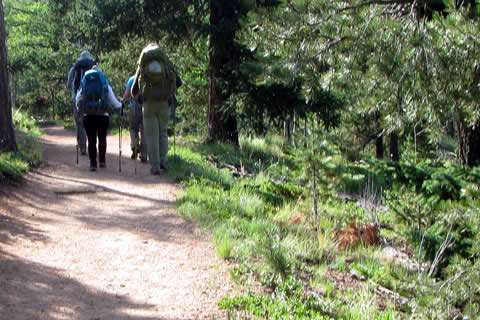| 597 | Trail Sense Kitchen Extras |
2012-03-12 |

There are a lot of special duties that are associated with the kitchen. The extras are each skill important in their own right. Here are a few tips ...
Packing - Don't be afraid to repackage food. Always lose the cardboard it takes up space and weighs extra.
Packing - Don't worry about eating squished foods. If you don't like mashed foods, then buy less mashable options. For example, use tortillas or bagels instead of sliced loaf bread; or carry fruit bars (Fig Newtons) instead of toaster breakfast tarts (Pop Tarts).
Packing - We use bread bags to repackage food. We reuse our collected bags and supplement them with the simple plastic storage bread bag found among all of their zip lock cousins.
Packing - Two pounds of food equals about 3250 calories. We try to carry less than that to eat per person. If we were on a thirty day backcountry trip, we might need that many calories per day, but for shorter trips it is okay to go a little hungry in order to carry a lighter pack.
Packing - Until I am acclimated and fit, I find that I do not have a huge appetite. I have always thought the loss of appetite was my body's efforts to lose weight in order to match the demands of the increased exercise. I do not need to pack as much food for days early in the trip.
Lunch - Lunch begins within minutes of leaving the trailhead. We like to eat while moving and not really have a sit down lunch. For example on a recent 20 mile plus hike, I had an energy bar in my pocket that I pulled off bites from and ate all day long. I still had a piece left for the ride home. I think they make a product that is already in bites, but it probably costs more.
Lunch - Other than bites to nibble on all day, we also carry snacks to eat - one snack for every couple of hours on the trail. A ten hour hike would require at least five snacks.
Water - We filter our water on the trail. It is quick and easy. In fact we pack less water, knowing that we will stop, filter water and drink it on the spot. If we do not carry a filter, then we carry more water. Whether we carry a filter or not, we have iodine tablets in our emergency kits.
Water - Water at camp may be boiled instead of treated or filtered. Once the water starts bubbling in the pot, the pathogens have been killed. The water begins to boil at about 150 degrees.
Clean-up - If you are going to boil water in the pot at the start of each meal, do not worry about using soap to clean the pot. Let the water boiling clean it for you. (You still need to get all the food out of the pot, you just don't need to use soap.)
Clean-up - Make sure you are at least 300 feet away from the water source and camp before you clean your dishes. Use a strainer and plastic bag to catch all food particles.
Kitchen - Though, we have not tried it yet, I like the idea of cooking on the the trail or on the go. In the morning break camp and start hiking. After a couple of hours, stop and have breakfast. Hike through the day and stop at dinner time and cook on the trail again. Then, restart and walk for another hour or so before camping.
Kitchen - Using the on the trail cooking technique, you would be able to camp in some unique areas that before you would have never camped, because the area did not have water nearby for cooking.
Kitchen - If you want a more traditional cooking area near the tents - make sure it is at least three hundred feet from the tents and on a durable surface.
Food Storage - Use a bear storage container. Yes, they weigh a pound or two extra, but the containers take the guess work out of food storage. We really like using the containers.
Cleanliness - Don't forget to bring a small and light container of the hand sanitizer to use before handling food.
Happy foody trails
Trail Sense Food Links